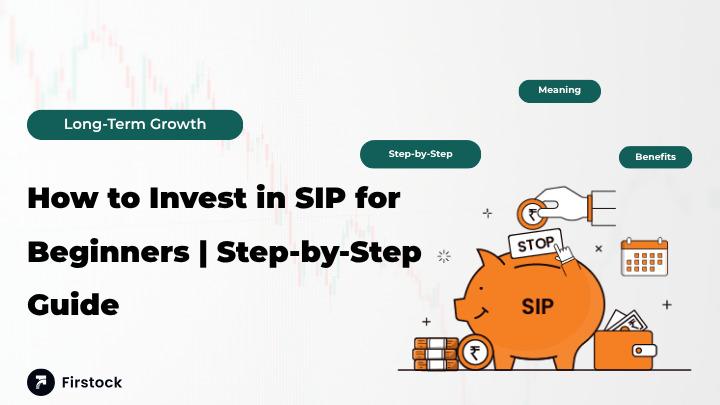How to Invest in SIP for Beginners | Simple SIP Investment Guide

How to Invest in SIP for Beginners: A Complete Step-by-Step Guide
Introduction
Are you new to investing and wondering where to start? You’ve probably heard people talk about SIPs (Systematic Investment Plans) — a smart and steady way to grow your wealth without worrying about timing the market. But what exactly is a SIP, and how do you begin?
Think of SIPs like planting a tree — you nurture it regularly with small amounts of money, and over time, it grows into something strong and fruitful. This guide will walk you through how to invest in SIP for beginners, step-by-step, using simple language and relatable examples.
Learn how to invest in SIP for beginners, sip investment meaning, sip investment full form, whether investment in SIP is good or bad, and how to invest in SIP without a broker using stock trading apps or discount brokers in India.
What is SIP Investment Meaning?
Let’s start simple. SIP stands for Systematic Investment Plan. It’s a method of investing a fixed amount of money regularly (weekly, monthly, or quarterly) into a mutual fund scheme.
Instead of investing a large amount at once, SIP allows you to invest small sums consistently, making it easier for beginners to start their investment journey.
In short: SIP is like a savings habit that helps you grow your money automatically over time.
SIP Investment Full Form Explained
The full form of SIP is Systematic Investment Plan.
It’s called “systematic” because you invest at fixed intervals and “plan” because it’s structured — you decide the amount, time, and duration in advance.
This disciplined approach removes the emotional aspect of investing and builds financial consistency.
Why Should Beginners Choose SIPs?
For beginners, SIPs are like training wheels on a bicycle — they help you learn balance while minimizing risks.
Here’s why SIPs are perfect for new investors:
-
Low Entry Barrier: Start with as little as ₹500 per month.
-
No Market Timing Needed: SIPs work through rupee cost averaging, buying more units when prices fall and fewer when they rise.
-
Compounding Benefits: Small investments grow exponentially over time.
-
Automatic Discipline: Regular deductions build a saving habit.
Is Investment in SIP Good or Bad?
Let’s address a common doubt — is investment in SIP good or bad?
✅ Good:
-
Long-term wealth creation
-
Low risk due to diversification
-
Easy and automated process
❌ Bad:
-
Not ideal for short-term goals
-
Returns fluctuate with market performance
Verdict: SIP investment is good for long-term investors who want steady growth with manageable risk.
How Does SIP Work?
Here’s how SIP works in simple terms:
-
You choose a mutual fund scheme.
-
Decide how much you want to invest monthly.
-
The chosen amount is auto-debited from your bank account.
-
You get mutual fund units based on that day’s NAV (Net Asset Value).
-
Over time, your investment grows through compounding and market appreciation.
Example:
If you invest ₹2,000 monthly in a SIP for 10 years at 12% annual return, your total investment of ₹2.4 lakh could grow to over ₹4.6 lakh!
How to Invest in SIP for Beginners – Step-by-Step
Here’s a simple step-by-step process for beginners:
Step 1: Define Your Goal
Decide your purpose — retirement, buying a house, education, etc.
Step 2: Choose the Right Mutual Fund
Pick from categories like equity, debt, or hybrid funds based on risk appetite.
Step 3: Select SIP Amount and Duration
Start small — even ₹500 or ₹1,000 monthly makes a difference.
Step 4: Complete KYC
KYC (Know Your Customer) is mandatory. You can do it online with PAN, Aadhaar, and photo verification.
Step 5: Set Up Auto-Debit
Link your bank and schedule automatic SIP payments.
Step 6: Track Performance
Monitor your fund every few months, not daily — patience is key.
How to Invest in SIP Without a Broker
Many beginners wonder — Can I invest in SIP without a broker?
Yes, you absolutely can!
Here’s how:
-
Visit the mutual fund company’s official website (like SBI Mutual Fund, HDFC, or ICICI).
-
Register and complete your KYC online.
-
Choose your desired fund and SIP plan.
-
Set up auto-pay using your bank.
This direct method is cost-effective since you skip brokerage fees.
How to Choose the Right Mutual Fund for SIP
Choosing the right mutual fund is crucial. Here’s what to check:
-
Fund Type: Equity funds for long-term, debt funds for safety.
-
Past Performance: Look at 3–5 year track record.
-
Expense Ratio: Lower ratio = higher returns.
-
Fund Manager Reputation: Check consistency and expertise.
Tip: Beginners can start with Index Funds or Large Cap Funds — they’re stable and beginner-friendly.
Best Stock Trading Apps for SIP Investment
If you prefer investing via mobile, these are some of the best stock trading app for SIP investments in India:
-
Paytm Money – Simple interface, direct mutual fund investments.
-
Groww – Beginner-friendly and transparent.
-
Upstox – Offers both mutual funds and stock trading.
-
Angel One – Great for tracking multiple SIPs.
-
Zerodha Coin – Commission-free SIP platform.
These apps also help you track performance, manage SIPs, and make changes anytime.
Role of Discount Brokers in India for SIP Investment
Discount brokers in India have transformed investing by offering zero or low brokerage fees.
Some popular names include:
-
Paytm Money
-
Rupeezy
-
Shoonya by Finvasia
-
BlinkX by JM Financial
-
Upstox
They offer integrated platforms where you can invest in both stocks and mutual funds using one account — making SIP investing seamless and affordable.
Common SIP Mistakes Beginners Should Avoid
Even with a simple tool like SIP, beginners can make errors. Watch out for these:
-
Stopping SIPs during market dips: Market volatility is temporary; SIPs thrive on it.
-
Not reviewing periodically: Evaluate your funds every 6–12 months.
-
Ignoring goals: Match SIPs to specific objectives, not random returns.
-
Investing without understanding risk: Know your comfort level before choosing funds.
How to Track and Monitor Your SIP Investments
Tracking SIPs ensures you stay on course. Here’s how:
-
Use portfolio tracking apps like ET Money, Groww, or Kuvera.
-
Review fund performance every 6 months.
-
Compare returns with benchmarks (like Nifty 50).
-
Adjust SIP amounts if your income or goals change.
Remember: consistency matters more than timing.
Tax Benefits of SIP Investment
SIPs in ELSS (Equity Linked Savings Schemes) qualify for tax deduction under Section 80C, up to ₹1.5 lakh per year.
Key points:
-
Lock-in period: 3 years.
-
Returns are taxable under capital gains, but tax-efficient for long-term investors.
So, SIPs not only build wealth but can also help you save tax.
SIP vs Lump Sum Investment: Which Is Better?
Both have their place, but for beginners:
-
SIP: Regular, disciplined, less risky.
-
Lump Sum: One-time large investment, riskier if market falls.
SIP smoothens market volatility through rupee cost averaging, making it the safer and smarter choice for new investors.
Final Thoughts and Key Takeaways
Investing through SIP is like building a house brick by brick — slow but steady.
To recap:
-
SIP = Systematic Investment Plan
-
It’s great for beginners and long-term investors.
-
You can invest directly without brokers using stock trading apps.
-
Start small, stay consistent, and let compounding do its magic.
Remember, “The best time to start investing was yesterday; the next best time is today.”
FAQs
1. What is SIP investment meaning in simple words?
SIP means investing small fixed amounts regularly into a mutual fund instead of a large lump sum.
2. Is investment in SIP good or bad for beginners?
SIP investment is good for beginners as it builds discipline, manages risk, and grows wealth steadily.
3. What is SIP investment full form?
SIP stands for Systematic Investment Plan.
4. How to invest in SIP without a broker?
You can invest directly through mutual fund company websites or apps like Groww, Paytm Money, or Zerodha Coin.
5. Which is the best stock trading app for SIP investment in India?
Apps like Paytm Money, Groww, and Upstox are among the best for SIP investments in India.






